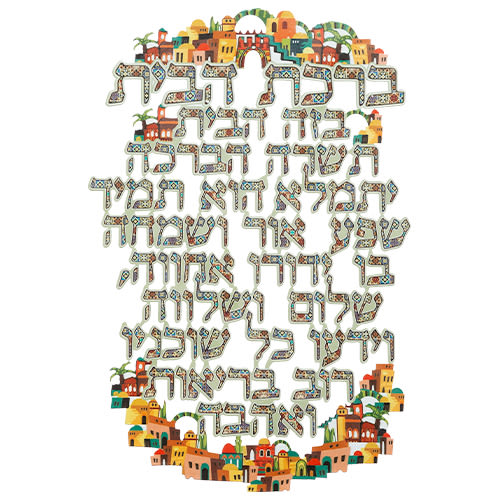
Mikeitz: A Personal Memo from Hashem
The Torah says that the trouble has "come to" the brothers, as if it were describing a visitor. We would have expected the Torah...

We saw his deep anguish when he pleaded with us and we didn't heed; that is why this trouble has come to us (Bereishit 42:21).
The language of the above passage seems strange. The Torah says that the trouble has "come to" the brothers, as if it were describing a visitor. We would have expected the Torah to use terminology such as the trouble has "befallen" or "come upon" the brothers. Since every single letter and every single word of the Torah are absolute and eternal truth, we have to ask ourselves what the intrinsic message the Torah is conveying by saying that the trouble has "come to" the brothers.
Rebbe Nachman of Breslev explains (Likutei Moharan I:54.2), that Hashem initiates the events of a person's life on three different levels – thought, speech, and deed – taking into consideration each person's particular situation at that given time. These events – namely, everything that happens to a person – are all hints designed to bring that person closer to Hashem. For that reason, one must think in depth in order to comprehend these messages from Hashem.
Rebbe Nachman is simply teaching us that everything that happens to us in life, from the most significant events to the tiniest mundane detail, are all personal memos from Hashem designed to enhance our relationship with Him.
Yosef's (Joseph's) brothers knew that their incarceration in Egypt wasn't the result of any recent crime. Their three days of isolation in prison severed them from contact with the outside world and from their daily routine, thus serving as an opportunity for serious self-evaluation and soul searching. The incarceration was Hashem's way of saying, "Please stop, for I have freed you temporarily of all other responsibilities. Take advantage of your stint in jail to ask yourselves what you did to deserve this." By virtue of this golden opportunity that Hashem gave them, even though it was embellished in a seemingly terrible predicament, the brothers were able to contemplate Hashem's message and ultimately reach the right conclusion so that they could correct what needed correcting.
Candidly and courageously, the brothers admitted their fault and vowed never again to mistreat a brother. Indeed, they made a solid commitment to do anything in order to save a brother.
Yosef's brothers exemplify the principles of teshuva: admission of guilt, requesting forgiveness from Hashem, and commitment to amend their ways. Ultimately, they realized that their time in jail was an opportunity to correct their misdeeds and themselves.
The brothers accurately understood that Hashem sent them the tribulation of incarceration not as a meaningless punishment, but as an opportunity for improvement and growth. As such, we can now readily understand why the Torah says that the trouble has "come to" them, like a hidden gift for their own good, rather than saying that the trouble has "come upon" them, like a punishment or a blow on the head. Yosef's brothers realized this principle by virtue of their searching for Hashem's message within the events of their daily lives.
With Hashem's loving grace, the following parable will help us realize the importance of understanding Hashem's messages:
The royal proclamation reached every province in the kingdom – the King needed a new head courier, a person of impeccable character, loyal, reliable, and swift of foot. The courier would be required to travel to the far corners of the earth in service of the King, deliver royal messages to their proper destinations, and return to the palace as speedily as possible.
Having interviewed thousands of candidates, the King's closest advisors narrowed the field to two candidates. Both were veteran soldiers of the elite royal cavalry, combat veterans whose loyalty and dedication to the King and country were beyond any shadow of a doubt. The first soldier was the unit's fastest runner, fiercest fighter, and best marksman. The second soldier was much less impressive on all counts, but he was the unit's intelligence specialist and map reader who was fluent in no less than a dozen languages.
The King couldn't decide between the two candidates – each had relative advantages. He debated with himself back and forth as to which of the two was preferable, until he finally decided to test them: The King sent the first candidate with a greeting to a tribal monarch in the wilderness of Manchuria, and sent the second with a gift to the King of Japan. Whoever would successfully complete the mission and return to the palace in the shortest amount of time would be awarded the post of head royal courier.
The two candidates set out on their respective journeys.
The first candidate carefully planned his itinerary, gleaning the maps for the best route. Once he reached Japan, he easily found his way to the Royal Palace, for he understood Japanese, could comprehend the road signs, and could even ask directions from passersby. Within two short days, he had already completed his task and had embarked on the homeward journey.
The second candidate traversed Russia in record time. On horseback, he crossed the Manchurian border. He reached a crossroads, and dumbfounded, stopped dead in his tracks. The road signs were all in Manchurian. He couldn't read Manchurian! He tried stopping a few of the locals he saw on the way to ask directions, but they only spoke Manchurian dialect and all he spoke was Russian and German. Frustrated but determined to complete his mission, the second candidate spent months roaming the vast expanses of Manchuria. Ultimately, he had forgotten completely about the mission and what he was doing in Manchuria, for all his efforts were focused on survival. Eventually, he forgot about his King and his homeland too.
While the new chief royal courier was eating pheasant-under-glass on His Majesty's table, his lost and bewildered counterpart was roaming a Manchurian forest in search of a few pine nuts or tubers that would enable him to survive for one more day…
* * *
Understanding Hashem's messages is exactly like understanding the road signs in a foreign country. No matter how strong, brave, or talented we are, like the second soldier, if we don't understand the stimuli in our environment – Hashem's personal memos to each of us – then we not only become disoriented, but we fail to complete our mission on earth. Even worse, those who ignore Hashem's messages don't even know what they're doing on this earth or Who sent them.
In order to become like the King's chief courier, one must understand the King's messages. Understanding Hashem's messages enables us to see how even the difficult times in life are growth opportunities designed for our ultimate benefit. We enhance our comprehension of Hashem's messages by trying to invest a minimum of sixty minutes a day in self-evaluation, personal prayer, and talking to Hashem. The more we communicate with Hashem, the better we understand His language. May Hashem open our eyes and heart to His Divine memos always. Amen.











Tell us what you think!
Thank you for your comment!
It will be published after approval by the Editor.